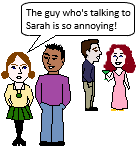Read about relative clauses (also called 'restrictive relative clauses') below. Then, when you are ready, try these relative clauses practice exercises.
Using defining relative clauses

These work a bit like adjectives - they are used to give information about a person, place or thing. The information is necessary - without this information we don't know what you are talking about. Use relative clauses after the thing you are defining - here the man:
I hate the man who's talking to Sarah.
The man who's talking to Sarah is so annoying!
Relative Pronouns (and related words)
For things we say that (which is also possible) and for people we say who or that. For places, we say where and for possessions (e.g. my car, his brother) we say whose + noun.
I like the dress that your sister's wearing.
I like the man who's talking to your sister.
I like the shop where you bought that dress.
I like the woman whose brother I met.
Rules for defining relative clauses
Do I need who/that?
You don't need to say who or that if there is a noun (the subject of the verb) afterwards.
That's the man (who) I love.
We don't need who here because the verb love has a subject (I).
That's the man who loves me.
We need who here because there is no noun afterwards (who is the subject of the verb love).
When do I use whom?
We should use whom for people after a preposition or as the object of a verb. However, this is less and less common nowadays, and in informal English most people use who.
I was talking to the student with whom you went on holiday.
This is correct, but sounds very formal and unnatural.
I was talking to the student who you went on holiday with.
This isn't grammatically correct, but it sounds much more natural. (It's probably even more natural to remove who completely here - see the rule above)
Can I use which?
Some people use 'which' instead of 'that' to talk about things although many grammar guides* now advise not to use 'which' in these defining relative clauses. However, when there's a comma (,) before the clause we must use which not that (for use of commas, see the next lesson: non-defining relative clauses).
The first Harry Potter book, which was written in 1997, has sold more than 120 million copies.
Now try these relative clauses practice exercises.
*See for example the APA (American Psychological Association) style guides.
